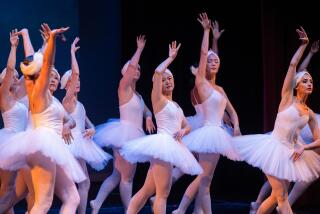She’s a Survivor : ‘The Merry Widow,’ Like the National Ballet of Canada, Has Weathered Some Tough Times
Before it was a ballet, before it was one of the world’s most popular operettas, Franz Lehar’s “The Merry Widow” was a popular play--”L’Attache d’Ambassade” by Henri Meilhac, otherwise known as the librettist for Bizet’s “Carmen” and other operas.
With its fertile plot, Meilhac’s play, written in 1861, seemed ideal fodder for a comic operetta. The bankrupt country of Pontevedro, an imaginary Balkan principality, has to prevent the rich widow Hanna Glawari from marrying a foreigner, lest her millions go out of the country. How she manages to marry the man she loves (the apparently philandering Count Danilo Danilovich), save another woman’s marriage (despite ensuing heartbreak) and save the country ultimately would get worked out in memorable three-quarters waltz time.
But Lehar, son of a military bandmaster, was not first choice as the composer for “Die Lustige Witwe.” The work was first handed to Richard Heuberger (whose “Der Opernball” alone of all his works is still staged--at least in Germany). But Heuberger’s attempt displeased the “Widow” librettists; so Lehar was brought in.
Even so, the management at the Theater an der Wein, where the work was premiered in 1905, expected little success. So they gave it as cheap a production as possible, with old sets and costumes.
Though the work was initially well-received, box office flagged. But slowly, audiences began picking up and within two years, “Die Lustige Witwe” had been given in virtually every city in Germany. International triumphs followed.
With the help of Australian dancer and choreographer Ronald Helpmann, who provided the scenario, British choreographer Ronald Hynd created “The Merry Widow” as a ballet in 1975 as a vehicle for Margot Fonteyn, who was then at the end of her career. She danced the premiere with the Australian Ballet. John Lanchbery made the musical adaptation from Franz Lehar’s score.
The National Ballet of Canada, the only company other than the Australians to dance the work, acquired the ballet in 1986.
Unlike Hanna Glawari, the National Ballet of Canada does not have unlimited millions.
“We have been through a very rough time last season,” said company artistic director Reid Anderson. “The recession hit (Canada) rather quickly, and we had to get into scramble-mode very quickly. There were some dancer layoffs.”
Which was a change of custom, he said. The Toronto-based Canadian company generally guaranteed 52-week contracts for all the principal dancers and for any dancers who have been with it for six years or more. The others are guaranteed 45 to 47 weeks.
“The dancers virtually danced all year round for the last five years,” Anderson said.
Funding support comes from the Canada Council, a blanket umbrella funding group for all the arts in Canada, the province of Ontario and the city of Toronto, as well as from the private and corporate sector.
The budget for the year was about $17 million, according to Anderson, but “by virtually counting paper clips” the company was “able to cut $1.2 million.”
“We really got our act together by taking a long hard look at everything in the company,” he said.
Dancers were laid off three weeks longer than usual during the summer, and Anderson and “everyone else” was put on a “wage freeze,” he said.
But the net result, he insists, was positive. “When the dancers came back, everyone was dying to start,” he said. “It created a sort of electric atmosphere: ‘Let’s roll up our sleeves and get going.’
“Oftentimes when you go through something like that and you’re coming out the other side, you can see it as positive,” he said. “But the recession is still very much in evidence . . . although right now, I’m cautiously optimistic about the future.”
What: National Ballet of Canada dances “The Merry Widow.”
When: Thursday, Oct. 10, through Saturday, Oct. 12, at 8 p.m.; also Saturday and Sunday, Oct. 12 and 13, at 2 p.m.
Where: Orange County Performing Arts Center, 600 Town Center Drive, Costa Mesa.
Whereabouts: San Diego (405) Freeway to Bristol Street exit. North to Town Center Drive. (Center is one block east of South Coast Plaza.)
Wherewithal: $12 to $44.
Where to call: (714) 556-2787.
More to Read
The biggest entertainment stories
Get our big stories about Hollywood, film, television, music, arts, culture and more right in your inbox as soon as they publish.
You may occasionally receive promotional content from the Los Angeles Times.










